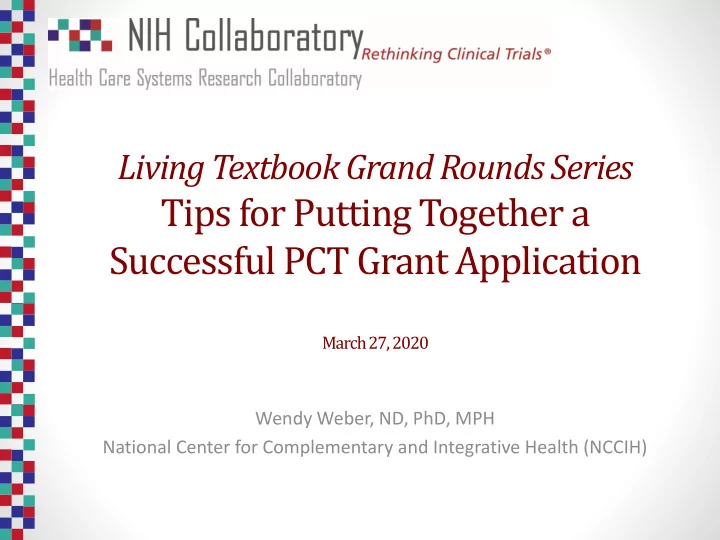

Living Textbook Grand Rounds Series Tips for Putting Together a Successful PCT Grant Application March 27, 2020 Wendy Weber, ND, PhD, MPH National Center for Complementary and Integrative Health (NCCIH)
Agenda • Confirm PCT is the best design • Find the right NIH program official • Find the right funding opportunity announcement (FOA) • Write a strong proposal that addresses review criteria
Does your study have the right design? • Be clear about the hypothesis you want to test and then design the study to test that hypothesis • PCTs are not the appropriate design to answer clinical trial questions
Key differences between explanatory and pragmatic trials EXPLANATORY PRAGMATIC Research Efficacy: Can the intervention work Effectiveness: Does the intervention work question under the best conditions? in routine practice? Well- resourced “ideal” setting Setting Routine care settings including primary care, community clinics, hospitals Participants Highly selected More representative with less strict eligibility criteria Intervention Tests against placebo, enforcing strict Tests 2 or more real-world treatments design protocols & adherence using flexible protocols, as would be used in routine practice Outcomes Often short-term surrogates or Clinically important endpoints; at least process measures; data collected some data collected in routine care outside of routine care Relevance to Indirect: Not usually designed for Direct: Purposefully designed for making practice making decisions in real-world decisions in real-world settings settings Adapted from Zwarenstein M, Treweek S, Gagnier JJ, et al. BMJ. 2008;337:a2390. doi: 10.1136/bmj.a2390. PMID: 19001484
Important things to know • Online resources are available for the development of pragmatic trial grant applications • NIH has policies and special forms related to clinical trial grant applications • Some things, such as milestones and safety monitoring, may be negotiated around the time of an award
National Institutes of Health • NIH is made up of 27 institutes and centers, or ICs • ICs award >80% of the NIH budget each year to extramural investigators • Each IC has a budget and a Director, and often their own review for large trials
Find the right NIH program official IC mission and priorities: • Focus on a specific disease area, organ system, or stage of life • Use Matchmaker tool in NIH RePORTER for suggestions • Talk to program officials (specific aims) • Consult your mentor and colleagues
NIH RePORTER matchmaker tool
Matchmaker results (example)
Find the right FOA • Request for Application (RFA) • For specific areas of science where more research is needed, and applications are encouraged for investigator-initiated research in this specific area of science • Usually single receipt date and special emphasis review panel • Specifies amount of funds available and number of awards that may be made
Find the right FOA • Parent Program Announcements (PA) • Allow investigator-initiated applications in many areas of science • Confirm Institute or Center participation • Other Program Announcement (PA, PAS, PAR) • For an area of scientific interest for one or more ICs where investigator-initiated research is needed • Often multiple receipt dates • Usually reviewed by standing study section
NIH scientific contacts • Check the FOA for the Scientific Contact of the relevant IC • If applying to parent FOA consider contacting IC contact: NCCIH Robin Boineau NIDA Sarah Duffy NCI Erica Breslau NIDCR Dena Fischer NHLBI Catherine Stoney NIDDK Susan Mendley NIA Marcel Salive NIMH Jane Pearson NIAAA Brett Hagman NIMHD Benyam Hailu NIAID Clayton Huntley NINDS Robin Conwit NIAMS Chuck Washabaugh NINR Karen Huss NICHD Sue Marden ODP Jacqueline Lloyd
Tailor the application Tailor your application to address all the FOA-specific instructions and review criteria
Common application pitfalls • Overly ambitious — beyond the life or length of the application • Missing or inappropriate control groups • Lack of sufficient expertise or skilled collaborators needed to complete the studies • Not sufficient publications in the area of proposed studies • Insufficient statistical power • Cannot recruit the needed population
Don’t assume that the study panel is going to understand what pragmatic means. They may have their own completely different definition than you, and it’s important that you get on the same page early on in your application.
Application dos • Justify the research • Include pilot data • Address potential overlaps • Reduce complexity • Ensure aims will advance the field • Choose appropriately expert personnel for a multidisciplinary team • Link data collection and analysis to aims • Justify the use of multiple sites and sample size
Application Don’ts • Skip any steps (eg, literature review) • Use dense or confusing writing style • Use appendix inappropriately • Include untestable aims • Include non-relevant aims or fishing expeditions • Assume that prior collaboration is irrelevant
Strategies for success • Pose a clear research question • Convince the reviewer your study is worth doing • Sell your research plan – highlight the strengths • Identify weaknesses and explain how you will deal with them • Tailor your application to the funding agency • Obtain feedback from your collaborators, consultants, and others
NIH research methods resources https://researchmethodsresources.nih.gov/
Important things to do • Read relevant Funding Opportunity Announcement multiple times • Identify program staff at your target NIH Institute/Center and ask them to review your Specific Aims • Obtain adequate feedback on the Research Plan from the entire study team
ePCT Resource: The Living Textbook Visit the Living Textbook of Pragmatic Clinical Trials at www.rethinkingclinicaltrials.org
Design chapter: Developing a Compelling Grant Application
Recommend
More recommend